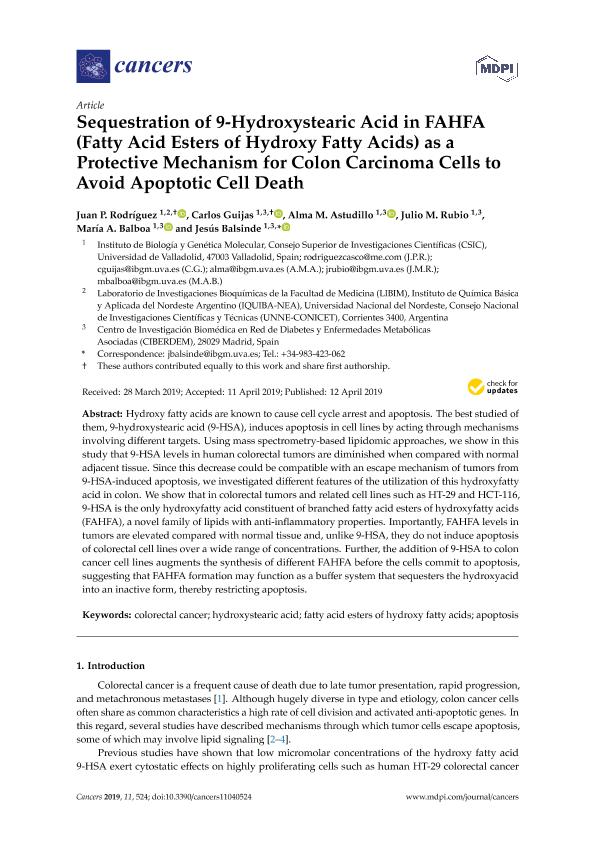Artículo
Sequestration of 9-Hydroxystearic Acid in FAHFA (Fatty Acid Esters of Hydroxy Fatty Acids) as a Protective Mechanism for Colon Carcinoma Cells to Avoid Apoptotic Cell Death
Rodríguez, Juan Pablo ; Guijas, Carlos; Astudillo, Alma M.; Rubio, Julio M.; Balboa, María A.; Balsinde Rodríguez, Jesús
; Guijas, Carlos; Astudillo, Alma M.; Rubio, Julio M.; Balboa, María A.; Balsinde Rodríguez, Jesús
 ; Guijas, Carlos; Astudillo, Alma M.; Rubio, Julio M.; Balboa, María A.; Balsinde Rodríguez, Jesús
; Guijas, Carlos; Astudillo, Alma M.; Rubio, Julio M.; Balboa, María A.; Balsinde Rodríguez, Jesús
Fecha de publicación:
04/2019
Editorial:
MDPI
Revista:
Cancers
ISSN:
2072-6694
Idioma:
Inglés
Tipo de recurso:
Artículo publicado
Clasificación temática:
Resumen
Hydroxy fatty acids are known to cause cell cycle arrest and apoptosis. The best studied of them, 9-hydroxystearic acid (9-HSA), induces apoptosis in cell lines by acting through mechanisms involving different targets. Using mass spectrometry-based lipidomic approaches, we show in this study that 9-HSA levels in human colorectal tumors are diminished when compared with normal adjacent tissue. Since this decrease could be compatible with an escape mechanism of tumors from 9-HSA-induced apoptosis, we investigated different features of the utilization of this hydroxyfatty acid in colon. We show that in colorectal tumors and related cell lines such as HT-29 and HCT-116, 9-HSA is the only hydroxyfatty acid constituent of branched fatty acid esters of hydroxyfatty acids (FAHFA), a novel family of lipids with anti-inflammatory properties. Importantly, FAHFA levels in tumors are elevated compared with normal tissue and, unlike 9-HSA, they do not induce apoptosis of colorectal cell lines over a wide range of concentrations. Further, the addition of 9-HSA to colon cancer cell lines augments the synthesis of different FAHFA before the cells commit to apoptosis, suggesting that FAHFA formation may function as a buffer system that sequesters the hydroxyacid into an inactive form, thereby restricting apoptosis.
Archivos asociados
Licencia
Identificadores
Colecciones
Articulos(IQUIBA-NEA)
Articulos de INSTITUTO DE QUIMICA BASICA Y APLICADA DEL NORDESTE ARGENTINO
Articulos de INSTITUTO DE QUIMICA BASICA Y APLICADA DEL NORDESTE ARGENTINO
Citación
Rodríguez, Juan Pablo; Guijas, Carlos; Astudillo, Alma M.; Rubio, Julio M.; Balboa, María A.; et al.; Sequestration of 9-Hydroxystearic Acid in FAHFA (Fatty Acid Esters of Hydroxy Fatty Acids) as a Protective Mechanism for Colon Carcinoma Cells to Avoid Apoptotic Cell Death; MDPI; Cancers; 11; 4; 4-2019
Compartir
Altmétricas



